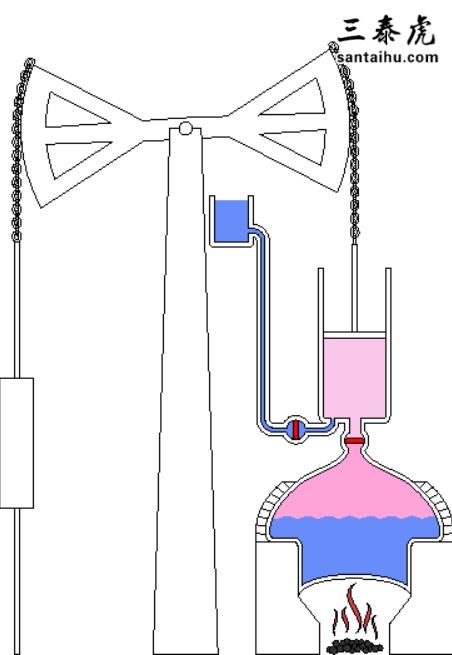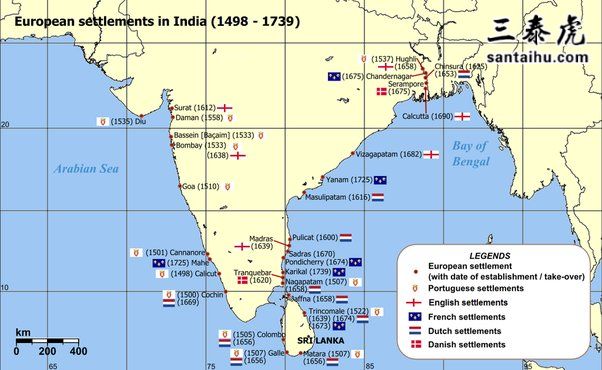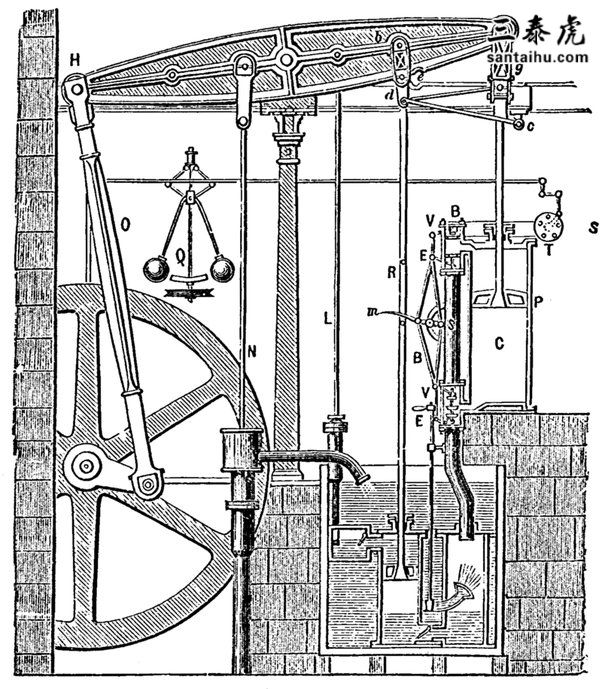Before the entry of the British, India had a lion's share in the world economy and a huge chunk of world exports, so why did our traders not recognize the European industrial revolution and bring back knowledge from their journeys to India?
在英国人抵印之前,印度曾在世界经济和出口中占据极大份额,为什么印度商人没有早点发现欧洲的工业革命并引入印度呢?
以下是Quora网友的评论:
SwiftOne SonOfSun
Industrialization is not a matter of ‘knowledge’ but of economics and need.
For example, it is often asked why Europe under Rome did not industrialize or even apply many scientific things known to them. The answer is that Rome had ample availability of both raw materials, markets and human labour i.e. Slavery
So to mechanize any process of production, was actually costlier than hiring/buying a bunch of people to do it.
工业化不属于“知识”问题,而是经济和需求的问题。
例如,人们经常问为什么欧洲在罗马统治时没有实现工业化,也没有将许多已知的科学知识付诸应用。答案是罗马拥有充足的原材料、市场和劳动力,也就是奴隶制。
任何机械化的生产过程,都比雇佣/购买劳动力更为昂贵。
Same applies for India, China etc., even when they did make scientific discoveries, many were not applied or had very limited application, to make any significant change to the society, because it was still far cheaper to use human labour.
It was kind of a resource curse of that age.
After the fall of Rome, Islam cutting of raw materials and markets, devastation of the population by Black death and wars - Europe did not have that curse, so had to put their efforts in leveraging science for mass production.
同样的道理也适用于印度、中国等国家,即便他们有了科学发现,也很少付诸应用,无法对社会产生重大变革,因为人力还是更便宜。
这是那个时代的资源诅咒。
罗马灭亡后,YSL切断了原材料和市场,黑死病和战争又对人口造成了破坏—欧洲没有资源诅咒,不得不费尽心思地利用科学来实现大规模生产。
The cost-benefit graph of manual labour vs. mechanized production, is not uniform. Industrialization is very costly at the start and even for certain levels of production, but once a threshold (different for different products) is reached, the cost of industrial production drastically drops and massively undercuts manual production.
But when they hit the threshold and had the capacity for “excess” production, it is the excess that required the West to colonize the world- both for raw material and markets.
As to knowledge, actually the knowledge used by the West for science and then industrialize, significant parts of it - Math, Physics etc, came from India/China - which they themselves did not find much use for, because of the ample human resources.
So it was not the knowledge that was the factor, but economic applicability.
体力劳动与机械化生产的成本效益图表并不相同。在工业化开始阶段,甚至在某些生产水平,成本都是非常高的,但一旦达到某个门槛(不同产品,门槛不同),工业生产的成本就会急剧下降,并大幅赢过手工生产。
但是当他们达到临界值并拥有“过剩”生产能力时,这种生产力的过剩就要求西方国家开始殖民其他国家—无论是为了原材料还是为了市场。
至于知识,实际上西方用于科学和工业化的知识,其中很大一部分—数学、物理等—来自印度/中国,由于人力资源充足,印度/中国自己并没有发现这些知识有多大用处。
所以,知识不是关键,经济适用性才是。
Adam Gurowski
Europeans were too involved too soon.
In 1712, Thomas Newcomen invented the Newcomen Atmospheric Engine which was a primitive steam engine intended to pump water out of coal mines. It was extremely inefficient and only made sense economically because the fuel for the engine was in the mine with it. And the mine itself made sense economically because so much of Britain had been deforested in the previous centuries so coal had to be used. Politically, Britain was fairly stable as the last violent change of power had occurred more than 20 years ago and it was moving along with parliamentary de ocracy.
欧洲人过早地卷入其中了。
1712年,托马斯·纽科门发明了纽科门大气机,这是一种原始的蒸汽机,可用于从煤矿中抽水。这种机器非常低效,只有在经济上才有意义,因为发动机的燃料和它一起设在矿井之中。而且从经济上讲,开矿本身也有意义,因为在过去的几个世纪里,英国的大部分地区都被砍伐殆尽,必须使用煤炭。英国在政治上很稳定,上一次权力的暴力更迭已经是20多年前的事了,英国的议会皿煮得到了发展。

The same year in the subcontinent, Jahandar Shah was on the Mughal throne for just part of the year and into a little of the next year before his nephew defeated him in battle and overthrew him. And there weren’t any coal mines in the subcontinent just yet. So despite the presence of Europeans in the subcontinent at the time, no enterprising entrepreneur would have been able to take the idea and bring it back home and apply it.
同年,在次大陆,贾汗达尔沙在莫卧儿王朝的王位上只稳坐了一小段时间,第二年没多久,他的侄子就在交战中将其击败并推番。当时印度次大陆上还没有煤矿。因此,尽管当时次大陆上有欧洲人,但没有哪个有进取心的企业家会把这个想法带回印度并实施。

Some years later, the British get involved in several wars across the subcontinent with rival Europeans. At the same time, the Mughal Empire was falling apart and by 1759, Alamghir II was a weak emperor beset on all sides by enemies from Afghans to Marathas. In the east, the de facto independent Bengal Subah was defeated in Battle at Plassey or Palashi and was conquered by Britain. That year, the British were making significant inroads into the subcontinent but James Watt had only started thinking about steam. It would be more than a decade later till he actually created a working engine that was far more efficient than the Newcomen Engine.
几年后,英国卷入了与欧洲对手在次大陆的几场战争。与此同时,莫卧儿帝国也开始分崩离析,到1759年,阿拉姆吉尔二世懦弱无能,四面受敌。在东部,已经独立的孟加拉苏巴在普拉西或帕拉希战役中被击败,被英国征服。那一年,英国人在印度次大陆取得了重大进展,詹姆斯·瓦特才刚刚开始研究蒸汽。直到十多年后,他才造出一台比纽科门大气机效率更高的机器。

A couple of years before Watt’s engine was first commercially installed, there was finally a coal mine in the subcontinent. However, it was under British control and owned by British people. And while Watt’s engine could finally be used outside of coal mines in places such as in textile production, the parts of the subcontinent that were producing the most textiles were again in British hands.
在瓦特的发动机首次完成商业化安装之前几年,印度次大陆终于拥有了一座煤矿。但它处在英国的控制下,归英国人所有。虽然瓦特的发动机最终也能应用在煤矿以外的地方,比如纺织品生产,但印度次大陆上纺织品产量最高的部分又回到了英国人的手中。
Arun Pagutharivu Podcast
That’s because most of the traders who took resources from here were not from here! The moment the european traders came in, they were taking the resources from us into europe, except they weren’t paying for it! They realized that if they can become our leaders, they don’t have to pay any price. How logical!
因为大多数从印度获取资源的商人都不是印度人!从欧洲商人进入印度的那一刻起,他们只会把我们的资源带回欧洲,而且不付钱!他们心知肚明,如果他们能成为我们的领导者,他们就不必付出任何代价。听起来似乎很合乎逻辑吧?!
P.S. Dhingra
India has got plenty of talent but lack of money power to get their ideas converted in to reality, as money makes the mare go. Every developmental efforts need enough money. That is why brain drain is there out of India in the shape of people trying to get employment in foreign countries to earn money for themselves and their children to develop more talented generation for India of tomorrow. So, foreign countries, who own money power, prefer to hire Indian economical talent and use them to develop their own products & services.
On the other hand Indian politicians can always be found conscious to develop their own personal powers , rather than India’s money power. That is why, India, having much more talent than other countries, is lagging much behind the wealthy foreign countries.
印度有很多人才,但缺乏资金,无法将他们的想法转化为现实,毕竟有钱才能使鬼推磨。每一项推动发展的努力都需要足够的资金。这就是印度人才外流的真正原因,人们想在国外找份工作,为自己和孩子赚点钱,为未来的印度培养更多年轻的人才。所以,拥有财富话语权的外国更喜欢雇佣印度的经济人才,用他们来开发自己的产品和服务。
另一方面,印度政客总是有意识地提高自己的个人*力,而不是印度的财富话语权。这就是人才数量更多的印度远远落后于富裕国家的原因。
Harishwr K
Part of problem, being lax in approach, to adopting to new industry, which has been evolving. Part problem is preconceived notions of high unemployment coz of mechanization of work. Part of problem is Brit Policy of mass production, while imposing extra costs on Indian goods to preventing them from exports. Share of Lion, got reduced to ant, by the time Brits had left India.
这个问题有一部分原因在于,为引入不断发展的新行业时采取的方法不够严苛;部分原因在于人们觉得工作机械化会导致高失业率的先入为主的观念;还有部分原因在于英国采取大规模生产政策,同时又对印度商品加收额外成本,妨碍印度商品的出口。等英国人离开印度的时候,印度商品原本巨大的市场份额几乎消失殆尽。
But actual transfer, was from intellectual property side (since late and early 14th and 15th centuries) Likes of Philosophical introspection of Rene Descartes “Cogito, ergo sum”, “I think, therefore I am”, Body-mind-soul, etc., Arthur Schopenhauer and the likes, while Indian Philosophy has been food for Western thought and the seed of major industry (which eventually helped Brahma Tattviks, to Wage 2 WORLD Wars, for Supremacy). This side has no mention in any Historian books. Initially Western Philosophy, speculated about God, but on the contrary Eastern Philosophy believed firmly exstence of GOD. Swami Vivekanandaa and the likes discriminated for knowledge, but Brit and the likes discriminated people. So Indians had lost, not only Economic boom days but also high morale ground, which used to exst, coz may be Hubris (part), Lack of grand vision (part), ever increasing population (part) and mounting problems of social structures, which became weak, as business share got reduced (multiplier effect, contraction).
Also Industry needs huge capital outlays, which requires machines and risk averse people. Further internal strife between communities further compounded to exsting problems.
但真正的转变,是从知识财富方面开始的(14世纪晚期和15世纪早期出现),比如勒内·笛卡尔的哲学内省“我思故我在”,身心灵三位一体等,亚瑟·叔本华等,而印度哲学一直是西方思想的源泉和主要产业的起源(最终帮助梵天塔塔维克发动了两次世界大战来争夺霸权)。这一方面在所有历史书籍中都没有提及。最初,西方哲学对上帝的存在进行了思辨,但东方哲学却坚信上帝的存在。斯瓦米·维韦卡南达等人歧视知识,而英国之流歧视的是人。
所以印度人不仅失去了经济繁荣的日子,还失去了曾经乐观向上的基础,因为可能是傲慢自大(部分原因),没有大局观(部分原因),不断增长的人口(部分原因)和不断涌现的社会结构问题(社会结构变得越来越脆弱),随着商业份额的减少(指数型收缩)。
此外,工业生产需要巨大的资本投入,需要机器设备和厌恶风险的人。社区之间进一步的内部冲突使现有的问题变得更加复杂。
Zalak Trivedi
Industrial Revolution happened post the great depression, by then Britishers were actually occupying Indian subcontinent. Infact, when Britishers introduced India with the industrial technology, the unemployment ratio started increasing as whatever work was being done with hands was now being done with machines.
So though industrial revolution might have been a boon to the world, when it was introduced in India, it was used to marginalize large communities of skilled workers and render them jobless.
工业革命是在大萧条之后爆发的,那时英国人已经占领了印度次大陆。事实上,当英国人把工业技术引入印度时,印度失业率开始上升,因为以前用手工完成的工作现在都被机器替代了。
因此,虽然工业革命也许是全世界的福音,但它被引入印度时却被用来排挤大批熟练工人,导致工人失业。
Skanda Veera
I do not think readiness for industrial revolution was an issue. Primarily the British policy of sucking India’s resources and killing Indian industry was responsible for underdevelopment. Finished goods in India had no competition in the west and the British sought to replace it with British industry, thus created the rule of exports of raw material to England and import of finished goods to India.
在我看来,有没有为工业革命做好准备是一个伪命题。英国榨取了印度的资源、扼杀了印度的工业,才是造成印度经济不发达的主要原因。印度的制成品在西方没有竞争对手,英国人就用英国工业来取代它,从而造成了将印度原材料出口到英国,再将英国制成品进口到印度的做法。
Nagaraj Subbarao
In many ways, India fuelled the industrial revolution in Europe. The British followed the Portuguese to India and set up shop in the 17th century Mughal India as traders during the height of Mughal Power ( Jahangir ).
It took another 100 years and foolish policies of the Mughals ( Aurangzeb and his followers) for them to realize that India was ripe for the taking. Indian armies lacked European discipline and were beaten time and again.
在许多方面,印度都推动了欧洲的工业革命。英国人跟随葡萄牙人来到印度,并在17世纪莫卧儿王朝鼎盛时期开始在印度开设商店。
又过了100年,莫卧儿王朝(奥朗则布和他的追随者)出台了一些愚蠢的政策,他们意识到是时候对印度下手了。印度军队缺乏欧洲军队的纪律,屡战屡败。
Also, Europe had emerged from the dark ages and was seeing a renaissance, particularly since the 16th century. Education had become widespread and important. India was probably regressing.
The energy of renaissance and Indian and Chinese money fuelled the industrial revolution and the British ruthlessly exploited India.
同时,欧洲已经走出了黑暗时代,特别是自16世纪以来开始进入文艺复兴阶段。教育越来越普及,地位越来越重要。而印度当时可能不断退步。
文艺复兴的势头加上印度和中国的资金推动了工业革命,英国人开始冷酷无情地压榨印度。
 (VIP)印度经济专家这样计算中国实
(VIP)印度经济专家这样计算中国实 (VIP)中国这家美的工厂每15秒生产
(VIP)中国这家美的工厂每15秒生产 (VIP)印度经济规模只有中国的六分
(VIP)印度经济规模只有中国的六分 (VIP)印度民族主义者认为印度是超
(VIP)印度民族主义者认为印度是超 谁掠夺印度最多,莫卧儿王朝、英国人
谁掠夺印度最多,莫卧儿王朝、英国人 印度拥有全球最大的黄金储备,为什么
印度拥有全球最大的黄金储备,为什么 17世纪,印度曾占世界GDP的25%。为什
17世纪,印度曾占世界GDP的25%。为什 (VIP)中国引领第四次工业革命,印度
(VIP)中国引领第四次工业革命,印度